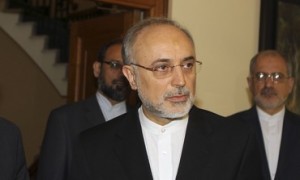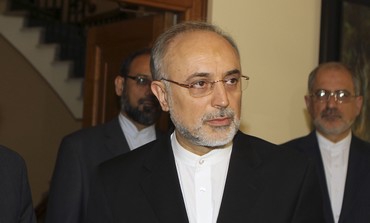 In response to ClintonÆs comments on holding direct US talks with Tehran, Iranian foreign minister says they have already happened.
In response to ClintonÆs comments on holding direct US talks with Tehran, Iranian foreign minister says they have already happened.A senior government official in Yemen has accused Iran of recruiting more than a thousand Yemeni youths and sending them to Lebanon and Syria to receive military training from Hezbollah, according to report on Monday by Kuwaiti dailyĀal-Seyassah.
The Yemeni official, who spoke on condition of anonymity, toldĀal-SeyassahĀthat Iran has spent around $1 billion on supporting the separatist movement in southern Yemen, and also accused Tehran of exploiting YemenÆs deteriorating economic situation in order to recruit young people from the provinces of Aden, Taiz and SanaÆa.
According toĀal-SeyassahÆs source, the young recruits are initially sent to Beirut or Syria, where they receive military training from Hezbollah operatives.
They then go on to the Iranian holy city of Qom, where they receive religious indoctrination, the official said.
The trained fighters are then sent back to Yemen to form subversive cells controlled by Tehran, the official added.
According toĀal-Seyassah, the source noted that the Yemeni government is very concerned about IranÆs recruitment of large numbers of Yemeni youth, and enlisting them to carry out espionage and sabotage on behalf of Tehran.
Yemen has long accused Iran of sponsoring insurgent groups in the north and south of the country.
Earlier this year, YemenÆs president, Abdrabuh Mansur Hadi, said Iran was providing support to both the Southern Separatist Movement ¢ a militant group that seeks independence for south Yemen ¢ and the ShiÆite Houthi movement in the north, whose slogan ¢ ōGod is Great, Death to America, Death to Israel, a Curse on the Jewsö ¢ indicates a shared ideology with Tehran.
In October, the Yemeni news site 26 September reported that domestic security forces had captured members of an Iranian spy cell, including Iranian, Syrian and Yemeni nationals.
According to that report, the Iranian members of the cell entered Yemen on the pretext of setting up a factory and had begun to transfer equipment and personnel to the southern port of Aden. However, when the Yemeni authorities inspected containers that the Iranians had imported, they found military equipment that could be used for assembling rockets and other weapons.
In March, a senior American official toldĀThe New York Timesthat the Qods Force, the elite extraterritorial unit within IranÆs Revolutionary Guard Corps (IRGC), is engaged in sending arms shipments to Houthi rebels in Yemen, including AK-47s and rocket-propelled grenades.
Both the US and Israel are concerned about TehranÆs increasing efforts to expand its influence over the Middle East, which come as its closest and largest regional ally, Syria, is increasingly under threat.
By enlarging its influence in Yemen, Iran aims to gain control over the Bab al-Mandeb Strait between the Gulf of Aden and the Red Sea, a crucial part of the route Iran uses to supply arms via Sudan and Egypt to its proxy Hamas in Gaza.
IranÆs presence in Yemen is also an attempt to create a proxy force, similar to Hezbollah in Lebanon, but on the border with TehranÆs rival Saudi Arabia, as part of its ongoing shadow war with that country.
Earlier this year, Gen. James N. Mattis, the head of the US militaryÆs central command, told a Senate Armed Services Committee hearing that ōIran poses the single greatest threat to US interests and to our friends and stability in the region, and poses a global threat through its worldwide proxy network.ö
ōFrom active attempts to exploit the Arab Awakening, to working to undermine and subordinate the democracy in Iraq, to supporting the Assad regime in Syria, to heightening ShiÆite-Sunni tensions, to active support for Lebanese Hezbollah, IranÆs activities are motivated by its hegemonic ambitions,ö Mattis said.
While most of IranÆs attempts to expand its regional dominance are undertaken covertly, Tehran has recently decided to publicly announce and capitalize on its role in supporting its Gaza proxies Hamas and Islamic Jihad.
Iran has mounted a large-scale and ongoing propaganda campaign both domestically and internationally in order to present the message that its military technology and expertise had propelled Gaza to a ōvictoryö over Israel, even falsely claiming on one IRGC-run news site that Iranian technology had allowed Gazans to shoot down an Israeli fighter jet.
On Monday, Iranian Foreign Minister Ali Akbar Salehi repeated that the Islamic Republic has already held direct talks with the US in the past on Iraq and Afghanistan issues.
ōDiscussions on specific issues... have taken place [previously] and there is nothing to prevent them doing so again,ö he said, in response to remarks made by US Secretary of State Hillary Clinton that Washington is prepared to hold direct talks with Tehran.
ōShould Iran finally be ready to engage in serious negotiations, we are ready,ö Clinton said.
ōWhen Iran is prepared to take confidence-building measures that are verifiable, we are prepared to reciprocate.ö
But Clinton warned that ōwhat we will not do is talk indefinitely. The window for negotiation will not stay open forever.ö
However, Salehi said he was not sure what issues Clinton was referring to when she raised the matter of direct talks, according to IranÆs IRNA news agency.
ōIf the secretary of state intended a discussion about the nuclear issue, this [matter] is ongoing... and is going according to procedure,ö Salehi said, noting that Iran had held talks with the P5+1 world powers ¢ the US, Britain, France, Germany, Russia and Chine.
However, Salehi said that if Clinton ōhad in mind political talks [between Iran and the US] raised in public debate, then in this case the decision would be taken by Supreme Leader Ali Khamenei, and it is he who would decide whether such a move would be made.ö
The foreign minister made similar comments last month, in response to statements by Russian Deputy Foreign Minister Sergei Ryabkov, who indicated that Moscow would support direct diplomatic contact between Tehran and Washington to avert an Israeli military strike on IranÆs nuclear program.
Salehi repeatedly pointed to Khamenei as the final arbiter of Iranian policy.
By Jerusalem Post
The Iran Project is not responsible for the content of quoted articles.











